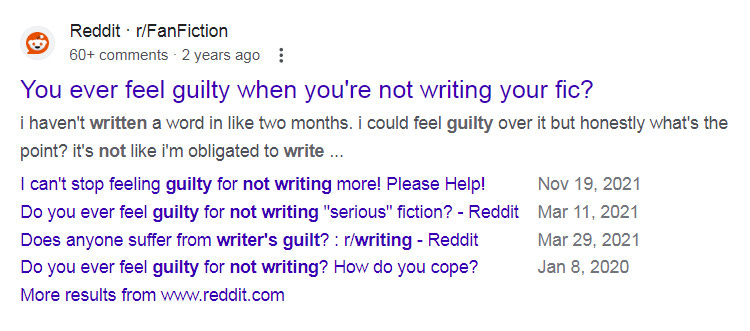✍️ When It Comes to Writing, Are You Guilty as Charged?
or, How to Stop Guilt’s Negative Feedback Loop
Who’s afraid of Virginia Woolf? Well, for one, Virginia Woolf.
“I ought to be writing Jacob’s Room; and I can’t, and instead I shall write down the reason why I can’t – this diary being a kindly blankfaced old confidante. Well, you see, I’m a failure as a writer. I’m out of fashion: old: shan’t do any better: have no headpiece: the spring is everywhere: my book out (prematurely) and nipped, a damp firework.”
Bolding mine. I’ve said it time and time and time again: even famous writers have their long, dark fail whales of the soul. Similarly, even famous writers wrestle with guilt when they’re not writing.
“I ought to be writing...” she writes. On the surface, it’s an ironic statement. But in fact what Woolf is doing here is trying to kickstart her own motivation by filling the “blankfaced” page of her diary (even during her creative blocks, she comes up with creative turns of phrase). There is something hopeful in her honest attempt.
Later in the same passage, she writes, “...one must face the despicable vanity which is at the root of all this niggling and haggling. I think the only prescription for me is to have a thousand interests – if one is damaged, to be able instantly to let my energy flow into Russian, or Greek, or the press, or the garden, or people, or some activity disconnected with my own writing.”
Oh, we could choose from a bouquet of writerly problems from this chunk of Woolf’s diary: fear, doubt, comparisons, creative block... not to mention her choices for fighting it. But for this post, I want to focus on her very first statement: I ought to be writing...
Why Do We Feel Guilty about Not Writing?
I hear this from writers all the time. I ask them how their writing’s going, and they shift away from me, look away from me, ting the top of their teacup with a fingernail, and say, “Oh, you know. Good.” Or, if they’re being honest, they’ll say. “Terrible.” or “Haven’t written a word.” or “I don’t think you can even call me a writer anymore...”
This last one is the most distressing.
I’m guilty of this, too. I can still feel the light stab in the tip of my finger from hitting my own teacup. I can’t speak honestly about anyone else, but my guilt stems from feelings of wondering if I actually am working hard enough on my WIP. Could I have spent a few more minutes before going to bed? Could I have slipped in an extra hour that Saturday morning instead of falling down a YouTube rabbit hole? Yes and yes. Would Stephen King let himself be sucked into not writing? Would Toni Morrison get distracted by clips from British sitcoms? No and no.
Or so we tell ourselves. And when someone asks us about our writing, we burn with the chemical reaction that turns our guilt into shame and embarrassment.

But as Virginia Woolf’s confession above illustrates, famous writers do get sucked into not writing and clips from British sitcoms (if they exist in their time). The difference is, they don’t go on talk shows expounding on all the times they didn’t write the novel. Biographers don’t tend to focus on the spaces in between. This cherry-picked reality generates this myth that the good writers – the real writers – sit down with a pen and a smoke and a coffee and churn out a masterpiece.
I’m also guilty of perpetuating the myth to a certain extent. Another thing I’ve said time and time and time again is that writer’s write. That’s it. If you write, you’re a writer.
So does it follow that if you don’t write, you’re not a writer? No, I don’t believe that. But how do I reconcile that paradox?
Tricky.
The “Get Out of Jail Free” Card for Writers
I think I’ve solved the problem, though. Repeat after me:
“I am a writer. But today, I choose not to write.”
Sounds too easy, right? That’s part of the beauty of this statement. It is easy. Here’s why it works:
You reaffirm your choice to be a writer while also reaffirming your choice to not write today – guilt-free!
You give yourself the card. So tomorrow, if you’re feeling the same way, you can give the card to yourself again.
You are accountable to nobody but yourself. That’s true when it comes to writing, not writing, and/or when it comes to calling yourself a writer.
In turn, you do not need a reason for your choice. You do not need an explanation.
It gives you a chance to, as Woolf puts it above, let your “energy flow” into other creative pursuits.
Hey, look. We could all write more. But there’s not use fretting about the hours we didn’t write. And, if we’re just not feeling it, maybe it’s okay to decide that today is not the day.
Of course, the next question that I can feel you all screaming at me through your screens is this: where does the madness stop? How many days in a row can you hand yourself that card before you can call yourself an ex-writer?
The answer, my friend, is blowing in the wind. Which is Bob Dylan’s oblique way of saying that only you can answer that one.
What I can tell you is this: guilt never helped any writer. When you weigh yourself down emotionally with what amounts to a useless, unwarranted feeling, you don’t get any writing done. I’m not trying to invalidate your feelings. I said right from the start: we all feel it. I’ve had my own irrational struggles with it, too. But if guilt drives us to write, it probably won’t be good writing and it certainly won’t be fun.
On the other hand, if you repeat the mantra above and review the bullet points, it will take a lot of the stress off. And that’s the thing: guilt is a negative feedback loop. You feel guilt so you feel stress so you don’t write so you feel guilt so you...
Somewhere, Sisyphus is laughing.
Break the loop. Tell yourself that today, you choose not to write. Then, stop worrying about it. Done. The rest of the day is yours!
Tomorrow, maybe you’ll feel the same way. I do know this for sure: when you take the stress of guilt off your shoulders, you’ll be much more likely to choose to write. That’s when you can embrace your writing again.
Key Takeaway: Guilt never helped improve anyone’s writing. If you’re not feeling it, give yourself a break and take the day off. If you’re giving yourself too many days off, well, maybe something else is at work that you have to exam. Often though, the problem is that guilt is a negative feedback loop. Break that loop by letting yourself off the hook.
Over to You: Do You Feel Guilty About Not Writing?
If so, why? What do you do to solve that guilt? Let us know in the comments below!
I’ll leave you with a short documentary on Virginia Woolf below.
Until next time, keep writing with wild abandon!
~Graham
email me if you get lost.








Another thoughtful take on one of the age-old challenges writers confront. Well-put, Graham.
I don't know how you knew I needed this post (hidden camera perhaps) as I binged BritBox and opened my laptop every day only to ignore it!
Giving myself permission to NOT write is as liberating and almost as exhilerating as completing an article or chapter!! You've read my mind on more than one occasion. Many thanks!